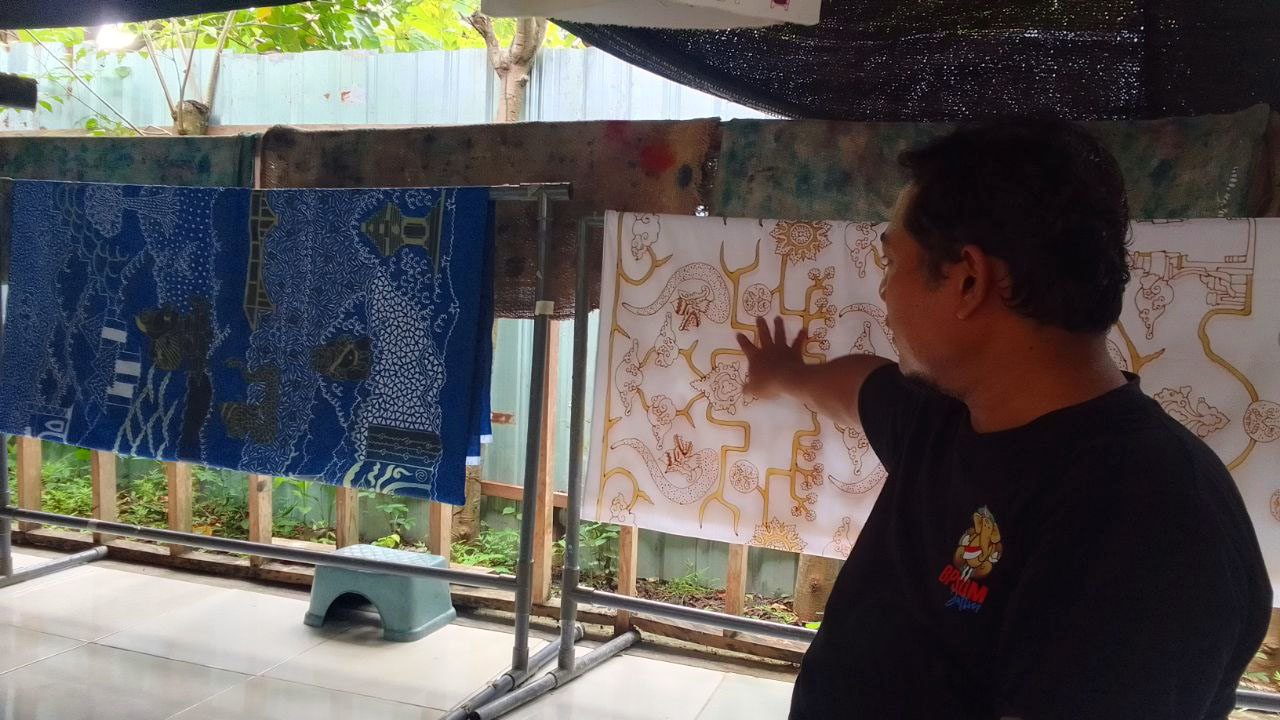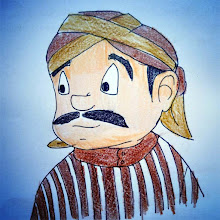IT WAS a fine noon. The February sun in Gresik was relatively mild that day instead of scorching heat with plain stickiness. The sky was dim with clouds while producing no rain. It was friendly until midday prayer that my visit to the Sanggraloka Batik Bangsawan in Sungonlegowo had become a permanently pleasant experience.
I had the privilege on Thursday (16/02/2023) to visit the Batik Bangsawan production site, accompanied by Nur Kholis, who prefers to be called a workshop leader rather than the founder or a business owner. The conversation went lively while I was watching the batik artisans carve colors on the selected fabrics.
 |
| Batik Bangsawan has accelerated the local economy and helped local traditions preserved. |
The unique Gresik Batik
If the Bungah District was previously known as a center for the production of national-scale songkok or religious caps, as well as shrimp paste and otak-otak, now Batik Bangsawan has emerged as a unique, prestigious commodity for tourists to bring as a special souvenir. In addition to economic value, every batik product by Nur Kholis comes with a dynamic, fresh design and adopts local culture to maintain tradition.
"In the past, the Bungah area had many songkok craftsmen, even to the national market. But due to a lack of regeneration, this business is no longer lucrative. While the brand exists, the production is actually sub-produced in other cities, including Lamongan," said Nur Kholis when explaining how he came to run the batik business along with his wife.
Kholis and his wife were into the batik business back in 2011 when they were selling various batik products made in different cities including Pekalongan, Central Java, and Madura, East Java. It was not until 2015 that they shifted into batik production under the umbrella of Batik Bangsawan.
“In a batik exhibition a visitor inquired if I had batik of my own, those made in Gresik where I live. That is when an idea sparked for us to have our own batik brand,” Kholis affirmed.
Together with his beloved wife, he decided to visit several cities known for their batik to learn about it. He started learning how fabrics are selected, the batik techniques, and how to design them seriously by studying one of them from a Sidoarjo artist, Joko Lelono, who is also the head of Sanggar Bening.
 |
| The peacock motif by Batik Bangsawan is very attractive |
From lompongan to huge success
Since then, Kholis has managed to produce his batik with persistent learning and perseverance. What’s strikingly unique is that he commenced the business from a narrow cubicle in his parents-in-law's house. Local residents call the passage lompongan. It is a narrow and normally elongated empty space that joins two houses in the Javanese villages. Rows of these houses are often inhabited by residents who are still related.
One of the prominent works created in this lompongan is the Suluk Lontar Surowiti. Nur Kholis points out that Batik Bangsawan produces this style of batik ornamentation with intent, inspired by the very popular Javanese philosophy. As for lontar (Borassus flabellifer), it is a palmyra palm tree on which the leaves may be written.
Surowiti is the name of a village located on the north coast of Gresik. Situated in the hills, the village has also been a part of the long history of the Land of Java. This is where traces of Brandal Lokajaya can be found. He is the son of a Tuban noble who lived as a delinquent and later built himself up with his students to become a very influential figure. He is none other than Sunan (Susuhunan) Kalijaga who has a special place among Javanese people.
 |
| The Suluk Lontar Surowiti accommodates the values of Javanese philosophy. |
The Suluk Lontar Surowiti batik pattern captures the paramount teachings and ideas of Sunan Kalijaga about the Javanese way of life (suluk) as reflected in the lontar (siwalan) trees that carry philosophical values.
Benefit value as a priority
From a lontar tree, we learn about creating benefits. The stalk, fruit, and leaves can all be put to good use. The fruit is normally consumed to relieve indigestion problems. The midribs and the leaves are also used, one of which by residents of Rote Island, as traditional roofing materials. Back in the past people used the lontar leaves to contain texts and images to convey messages.
Nur Kholis maintains that making benefits has been a primary value of his business. He aims at contributing positively to society the way siwalan trees provide benefits wherever they are destined to live. This very value is what he is trying to carry through by inviting local youths to become batik artisans in his studio instead of working as laborers in the factories nearby.
“We currently have 5 artisans here in the workshop,” he said in a separate interview. “In addition, there are two printed batik craftsmen and four tailors.” Apart from handmade batik, Batik Bangsawan also produces printed batik to meet the demand of the lower middle market.
 |
| The Suluk Lontar Surowiti captures the tremendous lyrics of the famous LIR-ILIR in Hanacaraka. |
In order to reduce operational costs, he is not stockpiling batik products since the order has been dominated by customized batik on the basis of customers' requests, including color, design, and motif.
To support his fellow batik businessmen, Kholis runs a store at the Bungah Market that offers ready-to-wear batik products such as robes for moslem women and or negligees. This way he is not only making profits to support his batik production but also opens up market opportunities for fashion batik producers, one of which is from Pekalongan, Central Java.
Success equals empowerment
While reluctantly mentioning monthly sales figures, Kholis can't deny that Batik Bangsawan is now coming into the spotlight as a widely-known craft business. He currently has an automobile as a business fleet and is constantly taking orders from the corporate market that agree to purchase a piece of batik from IDR 500K to 2 million.
“When we won the first place in the East Java competition lately, kami carried the concept of community development in which the human resources are all from our own village. What matters more is that we adopt local wisdom as the theme of the batik,” said Nur Kholis confirming Batik Bangsawan's victory.
He further claimed that this step is a manifestation of the government's program, namely One Village One Product (OVOP), which the East Java Governor Khofifah Indar Parawansa adapts to become OPOP (One Pesantren One Product).
He is convinced that the OVOP concept works only if SMEs adopt the concept of community development. In the context of Batik Bangsawan, Nur Kholis assures that batik artisans, shopkeepers, photographers, tailors, and photo models are all from one village where the business is located.
Despite the challenge, he would certainly not give up hope. Resembling a siwalan tree that stands tall and lives extremely long while producing fruit regardless of season, he strongly intends that Batik Bangsawan will take youths of Gresik to preserve traditions through the studio and workshop he is running. In this regard, the younger generation won't be tempted to work in the factories nearby due to fresh money to make. Instead, they are encouraged to help with the preservation of local cultural treasures to prevent them from extinction.
 |
| The book Kholis is planning to publish in the near future that captures Batik Bangsawan's luxurious batik designs |
What he aspires is that the Sanggraloka he is currently running will be able to provide a batik training center as well as own a publishing line. He is currently preparing to publish a book containing 50 designs and motifs typical of Batik Bangsawan with captivating charms that have the potential to bewitch readers as well as batik connoisseurs throughout the archipelago. In this way, Nur Kholis is expecting to boost the local economy while trying to preserve the uniqueness of local culture.
With an initial loan from a government bank, he has been determined to project sustainable balanced growth with independent resources. Batik Bangsawan is expected to grow as a profitable business. It's a balance because profit is the goal, but making a positive contribution to society is in the form of empowerment. Sustainability indicates endless passion to explore traditional values as well as a local heritage to appear in every pattern and design of Batik Bangsawan batik.
















